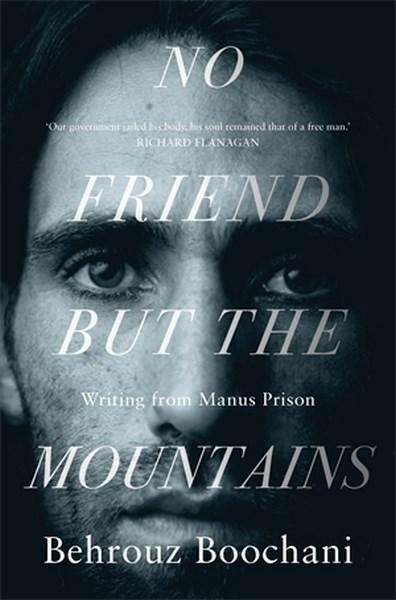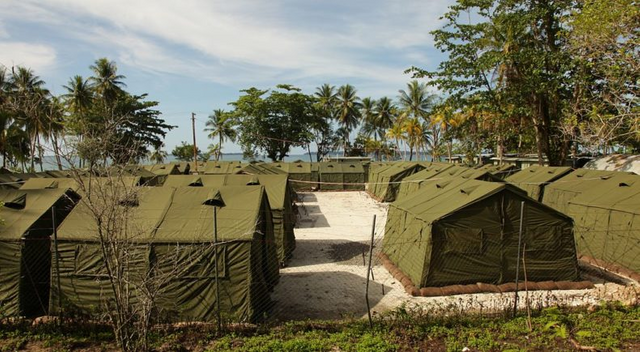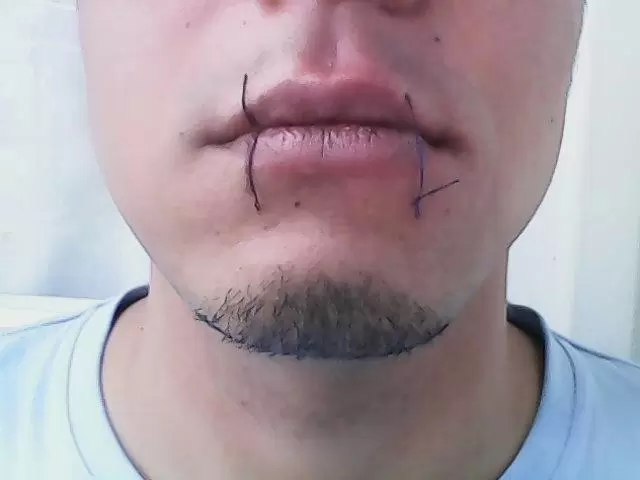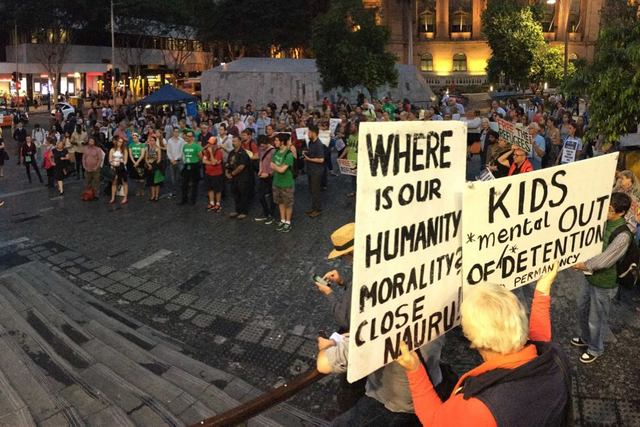Words That Challenge Systems of Inhumanity: 'No Friend But The Mountains'
Steemians are no strangers to writing on mobile phones - we're doing it for the upvotes, so we can cope with tapping out text on mini keyboards and sending it into the Steemzone. Imagine, however, typing it from confinement - from a place where the only crime you've committed is to seek asylum from political persecution. Imagine each text being translated and put together in a novel, and that novel winning 100,000 dollars in a literary prize set by a country that has incarcerated you for the last six years.
This is exactly what happened to Kurdish-Iranian writer Behrouz Boochani. Imprisoned in Australia's Manus Island, he fled Iran because of his advocating on behalf of the Kurdish people as a writer and a journalist. His book 'No Friend But the Mountains' is the story of his fleeing and consequent imprisonment on the island's Regional Processing Centre, and it won not only the Victorian Premiers Literary award for non fiction, but also the Victorian Prize for Literature, the highest prize you can win for writing in Australia. The irony of this kills me - not only was it not written by an Australian citizen, it was written outside of Australia by a prisoner that Australia said had no chance in hell of ever becoming an Australian citizen.

The fact he won this prize speaks volumes about the kind of Australia I live in - one that can persecute and dehumanise those who most need our help, and the willingness of Australians to reject the inhumanity of a government who could do such a thing.What a paradox.
Manus Island - an island part of Papua New Guinea - was an offshore immigration detention facility. The UN High Commissioner for Refugees, having visited and reviewed the centre, found that their welfare was not being met: they lived in terrible conditions, hot and full of mosquitos, with poor sanitation, little protection from the locals and a profound sense of despair due to the fact they've been locked up for many years without hope of eventual resettlement. The UN found that:
Australia remains ultimately responsible, as the state from which these refugees and asylum-seekers have sought international protection, for their welfare and long-term settlement outside of Papua New Guinea.Australian journalist Richard Flanagan captures these conditions far more emotively, capturing the horror that refugee advocates were desperately trying to explain to the Australian public - our own government was failing in it's responsibilities and was daily transgressing human rights:
The wretched of the earth, because they were no longer safe where they lived, sought to come here. With a determined cruelty, we kidnapped and imprisoned them in Pacific lagers. These lagers became synonymous with the idea of hellholes because it was important to our government that they be – and be known as – hellholes.

On this policy of deterrence, as it was called, which had as its declared purpose to make innocent human beings suffer indefinitely, we spent billions of dollars. To this end we had truck with vile regimes such as Sri Lanka’s. And to this end we began forsaking our democratic rights.
This appalled many of us - how can our country effectively censor the rights of Australians to speak up against atrocity? For many years Australia has participated in a grand conspiracy of silence about the historical repression, abuse and misegnation of it's First Nation's people, who are still suffering today because of what was done to them, yet it still seemed to happily partake in a 21st centry atrocity it condemned other nations for - in fact, went to war over, following America into Iraq. We swept what was done to Aboriginal Australia under the carpet as it was intensely shameful, yet equal atrocities were still happening in PNG.In the camps the refugees were made to answer to numbers given to them as their new identity. Denied their names they were not even allowed their stories. Every attempt that could be made was made by the Australian government, from the petty to the disturbing, to deny journalists access to the Pacific lager. When it came to imprisoned refugees free speech became a crime: for some years any doctor, nurse or social worker in the camps who publicly reported on the many instances, now well-documented, of rape, murder, suicide and sexual abuse of refugees was liable to two years’ imprisonment.
It was amongst the torture of Manus - largely run by paramilitary thugs - that Boochani spoke up against, even when he was a direct target of the Australian government for doing so. Here he wrote for The Guardian about the atmosphere of death hanging over the camp when a Rohingya refugee died, possibly from epilepsy, of which he was a known sufferer:
I hurry over to Oscar camp. The refugees have laid him out on the floor. The rim of his mouth is covered in foam and it seems his eyes have doubled in size. What could one possibly do in this situation? There is no medicine here. Everyone is perplexed and in a state of panic. One person pours water over his face. Everyone wants to do something, even though we all know too well that our efforts are in vain. He’s lying there for an hour before he finally starts to feel better. Everyone is frightened. Manus prison can no longer tolerate the death of another individual. There is a mood of death, climate of death. And for a moment the presence of death has completely disrupted the equilibrium in prison.
Death is always ever so present.
Death.
The breath of death.
The scent of death.
The reign of death over Manus prison. This is the reality of living out here.Continuing his diary of the countdown to the closure of the Australian-run detention camp, he wrote of the horror of the camp:
Starvation, thirst and terror slowly but surely dominate the prison. Gradually these factors impose their power over the incarcerated refugees. Bodies are weak, muscles are fatigued, spirits are weary. It has been nearly five years full of anguish – anguish that has ground everyone down. During this last week in particular, no one has slept properly. Everyone is weary out here, but the one mantra continues to reverberate:
We will never retreat and leave this hell of a prison. We will never move to another prison. We will never settle for anything less than freedom. Only freedom.
This is the scene here in Manus prison. These words are the soul of Manus prison. To you people who are looking on from outside the prison and think you understand exactly what is happening here, this landscape, which is replete with affliction, is totally incomprehensible. But I can only write about the environment here in prison. The words I write are starving, the words are thirsty … just like me. The pain of dozens of human beings all around me, with their clothes stripped off in this oppressive tropical heat, human beings with their bodies crushed, ravaged by mosquitoes – there is no end to the barbarity of the merciless mosquitoes … all this affliction is channelled through me in these words. Only those who have had to endure tropical condition will have some idea. The heat is a relentless attack, the mosquitoes conduct relentless attacks, the terror is amplified by the agonising heat and the tortuous mosquitoes. The trauma of Manus prison. Never forget that this place is Manus prison.Behrouz Boochani won the Amnesty International award for his writing about Manus. I find it hard to read about - I have found it hard to read about. Over the years I've been guilty of not reading about it because it hurt too much and I had to protect my own mental health. Being a priveleged white woman in a lucky country, I had the choiceavailable to me to do this. Whilst I went to yoga and hung out with my family and surfed and holidayed, men like Boochani were writing of, and experiencing, the heat, the mosquitos, poor sanitary conditions, lack of hope, sexual abuse, violence, crowded conditions and other horrors on top of the trauma of what they had experienced in order for them to want to leave their country in the first place. I did what I could, of course. I donated monthly to charities and bodies that were actively fighting to get men released, to alert the Australian public about what was going on, to put pressure on the government. But as I read Boochani's book, I cry - I had not done enough. Was powerless to do enough. The weight of this is as heavy on me as it is when I read about the trauma of Australia's indigenous people. I feel so terribly sorry - sorry that I belong to country that has done this and refuses to accept responsibility for it, or blame, or reparation.

From journalism to silence - some men on Manus sewed their lips together to draw attention to their plight. Image Source
Whilst the men doubt they can ever recover from what has been done them by the Australian government, one thing is absolutely clear - they feel they have absolutely no choice about what might be done to them at all. A letter from the refugees to government that seemed a satire was not - the letter pleaded that gas chambers or lethal injection was preferable to the treatment of men on Manus. Australia's hardline stance on asylum seekers meant that they wouldn't ever take the refugees, and instead they have been settled in the US or returned home to their country of origin.Whilst Boochani is stateless, he is still recognised with these rewards because it contributes the literary life of this country. It is through literature that we understand, and through literature that the truth can be told. Whilst stories like these might form part of Australian's shame, they are important to read, and whilst I have avoided it for a while, it now sits by my bedside. Each word rips at my heart, as I knew it would, but at least I can do his story a kind of justice by reading it. I loved that it wasn't in three of my local booksellers because it had sold out, and it wasn't on my usual online booksellers for the same reason - his story is being read, over and over, despite our government's desire to silence anyone who told the truth of the horror of Manus and other offshore detention centres.

But I'm glad we rewarded Boochani with a literary award, showing that we're willing enough to look at our atrocities, and acknowledge them.
Boochani himself writes of his humiliation and his victory for humanity in his acceptance speech, delivered by video link at the end of January.
When I arrived at Christmas Island six years ago, an immigration official called me into the office and told me that they were going to exile me to Manus Island, a place in the middle of the Pacific Ocean. I told them that I am a writer. That same person just laughed at me, and ordered the guards to exile me to Manus.
I kept this image in my mind for years, even while I was writing my novel – and even right now, as I’m writing this acceptance speech. It was an act of humiliation.
When I arrived in Manus, I created another image for myself. I imagined a novelist in a remote prison. Sometimes I would work half naked beside the prison fences and imagine a novelist locked up right there, in that place. This image was awe inspiring. For years I maintained this image in my mind. Even while I was forced to wait in long queues to get food, or while enduring other humiliating moments.
This image always helped me uphold my dignity and keep my identity as a human being. In fact, I created this image in opposition to the image created by the system. After years of struggling against the system that has completely ignored our individual identities, I am happy that we have arrived at this moment.
This proves that words still have the power to challenge inhumane systems and structures. I have always said that I believe in words and literature. I believe that literature has the potential to make change and challenge structures of power. Literature has the power to give us freedom. Yes, it is true.
I have been in a cage for years but throughout this time my mind has always been producing words, and these words have taken me across borders, taken me overseas and to unknown places. I truly believe words are more powerful than the fences of this place, this prison.
This is not just a basic slogan. I am not an idealist. I am not expressing the views of an idealist here. These words are from a person who has been held captive on this island for almost six years. A person who has witnessed an extraordinary tragedy unfold in this place. These words allow me to appear there with you, tonight.
With humility, I would like to say that this award is a victory. It is a victory not only for us, but for literature and art and above all, it is a victory for humanity. A victory for human beings, for human dignity. A victory against a system that has never recognised us as human beings. It is a victory against a system that has reduced us to numbers.
This is a beautiful moment. Let us all rejoice tonight in the power of literature.
Rejoice indeed - and may all of us have the courage to speak out against inhumanity, and the systems that allow it.
Posted from my blog with SteemPress : http://www.riverflowings.com/?p=242
I never knew about such pathetic life of a prisoner untill I read your posts. Crueltyt against humanity...can only been felt through these real experience author...who are living like hell condition and still have the courage to author book that can won them awards. I have read about India or middle East stories but never knew about such atrocities on other countries. At least I can say now, all the prison are same and have no feeling about humanity to them.
Posted using Partiko Android
Oh, it's awful - not many people know this about Australia!!! People think it's all beaches and barbecues - and Australians are quick to condemn other nations for their brutality, whilst forgetting it's happening in real time here.
Seriously, ..it's pathetic and very mean. I know about Australia as beautiful country...and little bit of cricket though it is too some harsh image..but now I can see the real truth
Posted using Partiko Android
ǝɹǝɥ sɐʍ ɹoʇɐɹnƆ pɐW ǝɥ┴
Cool!
Curated for #informationwar (by @Gregorypatrick)
Ways you can help the @informationwar!
When I first started reading this, I thought you were talking about the "The Gulag Archipelago" by Aleksandr I. Solzhenitsyn until I seen the author's name, Behrouz Boochani.
"The Gulag Archipelago" was a book that changed the course of Russian history, revealing the atrocities of a government that used terror against its own population.
But your book about Manus is about a modern day atrocity, which thankfully, Behrouz Boochani's work and the awarding of the literacy award, has shed some light on, revealing this ongoing inhuman treatment of folks, brought it to the forefront. May we not blindly ignore it.
I've only just begun reading the "The Gulag Archipelago" but the take I'm having is the fear produced by the act of the government gulag making arrests and prolonged imprisonment (without any just cause, many were just to fill the quotas handed down) This fear silenced the people and had them committing strange acts to try to avoid the dreaded moment of being arrested (and it seemed no one was immune to it happening to them).
Jordan Peterson (who wrote a new forward for the abridged version) had pointed out in one of his lectures that if we are really honest with ourselves, and acknowledge that we all have a dark side to us, when we think of what we would do if we were, say, the guard at one of those interment camps, what might we do to save our skin?
Although we may say that we would never act like those people through out history, the truth is that we are all very capable of doing those atrocities and until we acknowledge that, we will never have the strength to stop it arising if those horrid conditions were to occur.
Bravo for those who have used the power of literature to expose man's inhumanity that we may guard against it ever arising in us and be willing to speak out against it. There words may give us the impetus to criticize and to question our position on such things, to break the silence.
Thank you for bringing this to our awareness! May it awaken more folks, giving voice to those enduring such unnecessary hardships at our governments own hand.
What an incredibly thoughtful comment. It's funny that you mention the gulag as many referred to these detention camps as like them. I haven't read the gulag Archipelago but I read a day in the life of Ivan Ivanovich which is one of my favourite books of all time and I recommend it to my students.
One of the problems were these detention centres is that they had contractors in as security so the possibility of brutality was not as well monitored as it should have been. They also had women and children in these camps, some of which were born in captivity and had spent their lives there in terrible conditions. How on earth our government could criticize any other regimes I do not know.
Posted using Partiko Android
Oh @riverflows! That is so heart wrenching for those poor kids as well as all the others!
The Gulag Archipelago after being totally banned and the author having to go into exile for fear of imprisonment for writing it, is now a mandatory part of the school curriculum. How ironic is that.
I am reading the abridged version for the other is in 3 volumes. It is a real eye opener for me!
This is fucked-up shit.
I'm so glad that this man has been honoured, and that this book has taken out the award. Another fucking blight on this country's history.
I'm feeling you on the guilt bit.... what can we do? It appears to me that these fuckers just don't care, and no amount of 'public pressure' or opinion-polling makes an iota of difference. I want to know how they justify it to themselves and their families.
I understand the point about our shadow @porters... but owning the shadow is not simply accepting this so we can excuse the actions of demagogues and cruel tyrants. And unfortunately, Peterson's comments in this area (I've read plenty of them) are nothing but apologisms for fascists and terrorists — it's the "but bigots are people too" argument.
I've done a lot of shadow-work, and yes the work involves making peace with that suppressed part of your unconscious psyche... but that is also not permission to allow this behaviour to continue in oneself or others. This work leads to personal healing so that the behaviour stops.
It's not the conscious-shadow that does this to other humans, it's the repressed, silenced, unconscious shadow... the part of humanity that denies our inherent cruelty. These politicians justify their choices and actions with rhetoric and false logic, built on the presuppositions that are factually incorrect, and use slippery words and sales techniques to cover up the fact that they are nought but cruel, inhuman monsters.
Yep. Words are powerful. This man's book is (part of) the antidote against the venomous, poisonous words of the barbarians who hold the keys to these gulags.
Very, very well said. I couldn't be more ashamed of my country for allowing this to happen, but on the same hand, I'm over the moon he has won this award. I think there's been a bit of narkiness about the fact he's not Australian, but fuck that - he's contributed to the denouncement of the assholes that do such atrocities in the name of some bullshit or another that justifies such horror. I was stoked to see it disappearing off shelves, and hope as many people read it as possible. Including the politicians who put this system in place, of course, but can't see that happening. They're too busy sweeping it under the carpet, as they are experts at doing that.
Yeah I’m going to grab myself a copy.
The interesting thing is that they haven’t really swept it under the carpet. I have to say that if their intention was to do all this in the shadows, then it just shows the level of ineptitude the politicians and their snivelling bureaucrats have.
What’s icky is the thought that it was kinda deliberately public.... like being proud of the fact that it’s terrible to deter people-smuggling and all that wank. In which case it’s just positively evil.
😡
Posted using Partiko iOS
There's many aspects of it they did.. remember they were banning doctors and anyone else in the camps about talking about the conditions???
Posted using Partiko Android
But which draws more attention.....
Perhaps I’m giving them
More credit than its due, and they’re just blundering fools.
Posted using Partiko iOS
This is the sort of thing that makes me want to hide from humanity; there's only so much of it I can take in before I crumble. Seems silly considering it isn't happening to me, but I despair over the inability to effect change.
I found myself holding my breath as I read this. How is it that some people are capable of being so cruel?
How? Votes for elections. Lack of empathy.
Honestly. It's the shame of the nation.
Posted using Partiko Android
Damn, what power. After you mentioned that book I had to come look t your review. I knew nothing about this! His words at the end really touch me and remind me what Mandela said when he got out of “the cage”, “I never knew a day without freedom.” It’s incredible to me the fortitude expressed here and the power of writing to get one through. Truly truly a triumph. I’m glad Australians are standing up now! It’s not too late to not let this happen more.
Exactly. They're really rallying hard against the politicians that wanna keep this shit up. The book is beautiful. He's a very educated, philosophical man - it's definitely worth reading, if you can get it. I feel like I have to honour them by reading it, but it's not as difficult as I thought it would be - it's powerful, and beautiful.